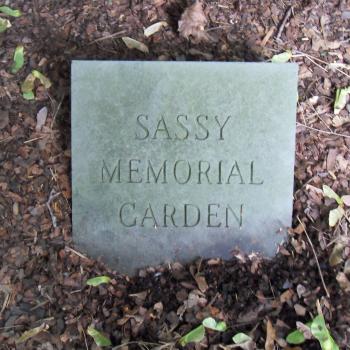 A friend mentioned a line from Hannah and Her Sisters the other day: “But in the morning, I forgot that I was happy.” That might not be the exact quote; it might not even be the right movie; but the line goes something to that effect. At any rate, we both laughed; the wit needs little explanation, which is the definition of that device. The quality of poignancy lies in a thing’s ability to be absorbed; poignancy can be understood as aptness to such a great degree that it has seeped through to touch the heart.
A friend mentioned a line from Hannah and Her Sisters the other day: “But in the morning, I forgot that I was happy.” That might not be the exact quote; it might not even be the right movie; but the line goes something to that effect. At any rate, we both laughed; the wit needs little explanation, which is the definition of that device. The quality of poignancy lies in a thing’s ability to be absorbed; poignancy can be understood as aptness to such a great degree that it has seeped through to touch the heart.
Still, while I know what it means, I believe the sentiment has more than one application. For example, I myself work the other way around. Rightly or wrongly, for good or ill, I have a constitution that rallies when the day breaks. My spirits rise with the sun. Night is the time in which it does not pay for me to think too much. I am a restless, imperfect sleeper, and prone to spectral thoughts as I toss to and fro. Let the day come, and I can leave them with the bedclothes.
But the line speaks to more than days and nights, happiness and unhappiness, and the variations of quixotic moods. The operative word is “forget.” That’s the part that translates to all occasions. Whoever we are, whatever we are up to, we cannot remember.
The line could be rewritten along this path: “But in the morning, I forgot what I had promised,” and though it would certainly be less humorous, it would undoubtedly still signify. And I think it would signify in a more profound way than the other, because there is a troubling detachment between memory and resolve, just as there is an even more troubling detachment between memory and fault, remorse, and sin.
The modern ethos bears a great prejudice against uncomfortable memories, particularly against memories in which we have, to put it charitably, been less than our best selves. Hackneyed characterizations of their effects slander these memories, and we are advised to be shed of them lest they drag us down. We are not to live “in the past,” it is said—as though the past is ever past, pace Faulkner.
While memories of fault should not hamstring us from action, without them, we cannot appreciate our forgiveness—if we have sought it—with any depth, nor can we make amendment of our ways with any real purpose. The wrong path can be traveled again and again if it is too easy to forget where it led, or to forget what we became in taking it. To quote Frost, the eye must weep “from a twig’s having lashed across it open.”
But that kind of disjunction—between memory and fault—involves a willful failure to remember. It is human to avoid pain and displeasure, and not surprising that it is a most reached-for option.
The disjunction between memory and resolve is more baffling. For rather than assert our will against our memory, muscling it out of the way, it is a failure of memory, a weakness, that seems most accountable when we forget what we have promised ourselves. The effort to block memories of past transgressions is a struggle because the memory is so strong; the ease with which we forget our good purpose is a collapse because the memory is so weak.
How easy it is to blow past the pledge, the oath, the vow to be a different person. I hope that I speak for more than myself when I say that it is in the fire-blown fury of my rages that a flash of memory whispers weakly: “But you swore you wouldn’t yell like this—you swore you wouldn’t threaten and terrorize—you swore you wouldn’t swear.” In the midst of my passions, I can look straight into my warranties of virtue and unblinkingly roll over, like a drunk shouldering off a missionary in order to mouth the neck of his bottle, like a satyr shoving back his mate so that he can wallow in the clutch of his whore.
I put my fist through the surface of a table, rocking over the crucifix placed there to warn me against such tantrums. This could all lead me to despair, had I not the promise of one who breaks no promises.
And now it is the purple season again. Now we climb within our hair shirts and smudge ourselves with ashes. We deprive ourselves of pleasures so that we can stir that asthenic virtue, recollection, into battle against our natures. For it, recollection, must bring us both old news of what we are, so that we can stand any hope of overcoming ourselves, and old news of what we are not, so that we can stand any chance of becoming other selves.
Emily Dickinson, ever poignant, summed up dual-sided memory—the joy it brings and the grief—“a strange bell—jubilee, knell.” If I am ever to be happy, I must recall what has brought me sorrow; if the purple will ever be exchanged for the white, I must summon what has changed my purpose. I must remember, it seems, so that I will never forget.
A.G. Harmon teaches Shakespeare, Law and Literature, Jurisprudence, and Writing at The Catholic University of America in Washington, D.C. His novel, A House All Stilled, won the 2001 Peter Taylor Prize for the Novel.











